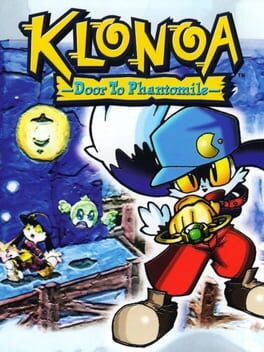playing klonoa feels like reminiscing about childhood with a friend who came from the same sorta social patch. some details won’t match up and some details are too broad generic to get caught up on, but every once in a there’s some hyper specific throughline. could be as minute as also happening to marching around barefooted looking for pecans sometimes, doesn’t really matter—that mutual nostalgia feels all the sweet regardless
i imagine if you could lift the misty veil off our dreams, you’ll probably see the phantasmic-but-oddly-photorealistic landscapes of phantomile. not to say there was some massive movement here, more so a handful of isolated incidents, but i really dig the odd fixation on oneirology we saw throughout that gen. no idea if this was the product of developers registering that technology was just at the right level to render vague, dreamy approximations of reality but not quite at the level of making new york city replicas, but it works nevertheless
nights played with this and mixed in suggests some analytical psychological theories; lsd dream emulator rejects any sense of formality by haphazardly throwing cultural, social, and religious sign around to create a game that is one part eerie, one part tender. klonoa takes this theming and dials it up on the whimsy, framing itself as a harlequinesque pop-up book concerning around human desires. what should be meek, passing touches on high concepts are deeply afflicting, all thanks to their shared framing device
again, beneath the mirage, there’s a real sense of familiarity ingrained here. they’re distant as they are true to life. it taps into a primordial understanding of our world and how we interact with it. i’d honestly say accurately articulating this is unattainable feat, but i really mean it when i say there’s something about these game’s audiovisual presentation that gives them an unmatched intimacy
i imagine if you could lift the misty veil off our dreams, you’ll probably see the phantasmic-but-oddly-photorealistic landscapes of phantomile. not to say there was some massive movement here, more so a handful of isolated incidents, but i really dig the odd fixation on oneirology we saw throughout that gen. no idea if this was the product of developers registering that technology was just at the right level to render vague, dreamy approximations of reality but not quite at the level of making new york city replicas, but it works nevertheless
nights played with this and mixed in suggests some analytical psychological theories; lsd dream emulator rejects any sense of formality by haphazardly throwing cultural, social, and religious sign around to create a game that is one part eerie, one part tender. klonoa takes this theming and dials it up on the whimsy, framing itself as a harlequinesque pop-up book concerning around human desires. what should be meek, passing touches on high concepts are deeply afflicting, all thanks to their shared framing device
again, beneath the mirage, there’s a real sense of familiarity ingrained here. they’re distant as they are true to life. it taps into a primordial understanding of our world and how we interact with it. i’d honestly say accurately articulating this is unattainable feat, but i really mean it when i say there’s something about these game’s audiovisual presentation that gives them an unmatched intimacy

Archagent
1 year ago